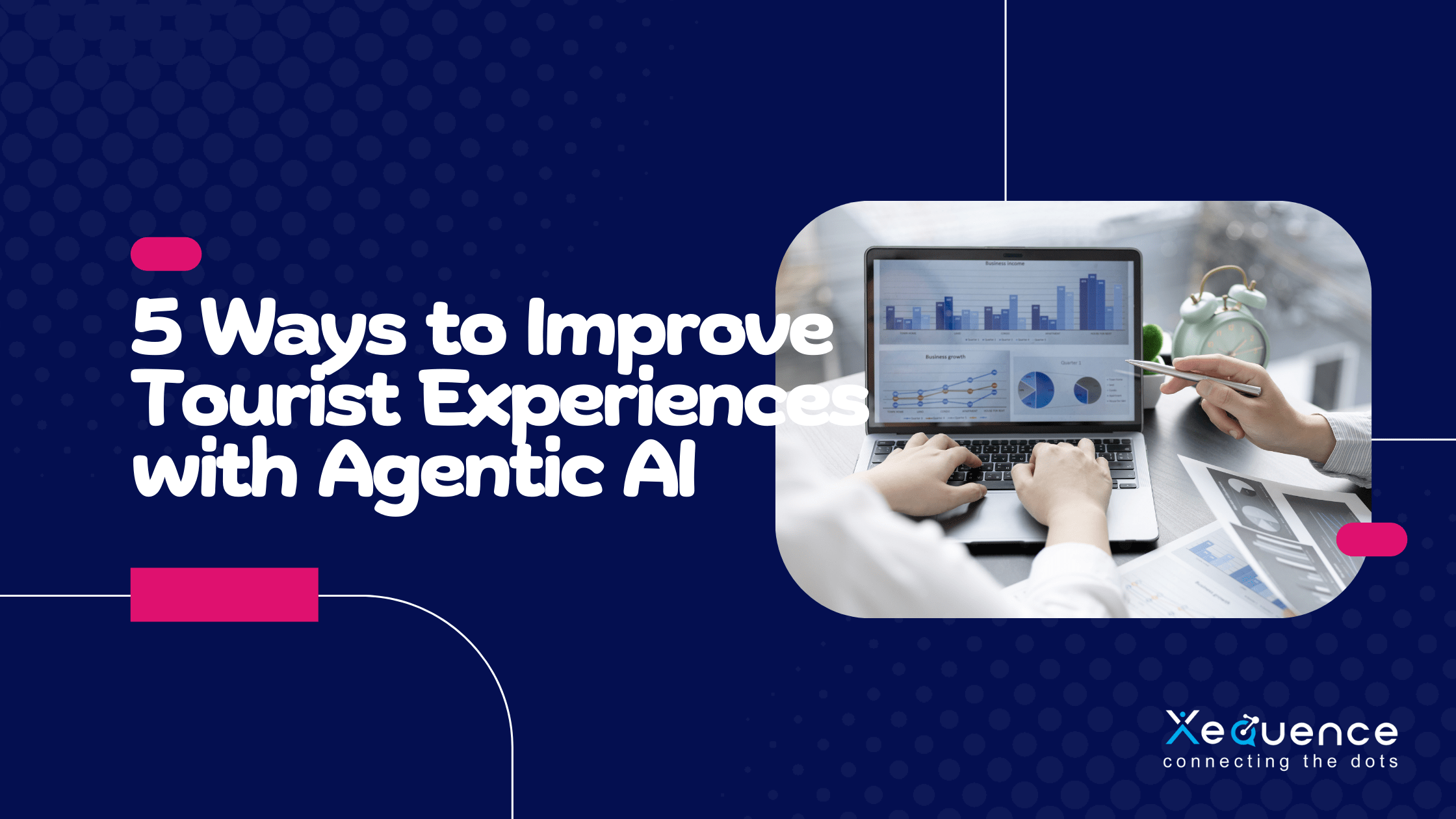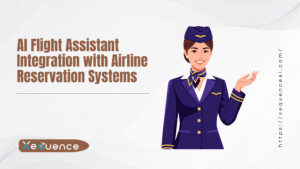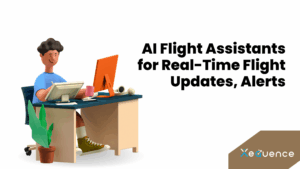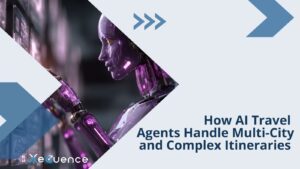- Home
- Uncategorized
- 5 Ways to Improve Tourist Experiences with Agentic AI
5 Ways to Improve Tourist Experiences with Agentic AI
- April 17, 2025
- Rajib Kar
- Uncategorized

Agentic AI Is Reshaping Our Travel Experience: Top 5 ways
In the ever-evolving world of travel, artificial intelligence (AI) is a driving force of transformation, reshaping every step of the journey—from the initial spark of inspiration to visit a destination to the return home. By building an AI-powered travel ecosystem, businesses have seen significant gains in conversion rates, strengthened user loyalty, and cultivated vibrant global communities. More than just streamlining trip planning, AI is redefining travel with a future rooted in efficiency, personalization, and meaningful connections.
AI is already making a tangible impact
Facial recognition is now used for smoother, more secure check-ins at airports and hotels, while biometric systems enhance safety and convenience. In hospitality, AI-powered robots assist with tasks like room service, concierge duties, and cleaning. Some airports also use robots for handling luggage and providing customer support. On the digital side, Agentic AI algorithms analyze user behavior, preferences, and travel history to deliver personalized suggestions for destinations, accommodations, and activities.
Agentic AI Offers Smart Travel Planning for Travelers
The ability to quickly and effectively interpret complex inquiries and guide users to personalized recommendations, bookings, and detailed itinerary planning exemplifies the future of smart travel planning. With AI-powered travel assistants, vacation planning becomes as simple as chatting with a friend, eliminating the need for manual input and search filtering. What would take hours or days to arrange manually can now be done in minutes. For instance, TripGenie offers customizable, editable itineraries in less than a minute and can handle complex requests, such as arranging multiple destinations.
Agentic AI Optimizes Pricing and Predictive Maintenance
Businesses use Agentic AI to assess past booking trends, consumer demand, and external factors such as weather and events to optimize pricing in real time. Dynamic pricing techniques help companies maximize revenue and hotel occupancy rates by adjusting prices accordingly. AI also plays a crucial role in the transportation industry through predictive maintenance, helping to foresee and resolve potential issues with vehicles and aircraft before they cause disruptions.
Agentic AI Drives Customer Satisfaction
Modern travelers increasingly seek convenience and personalized experiences throughout their journey. AI-powered travel assistants are rising to meet these expectations, revolutionizing how businesses engage with their customers. A key example is personalized recommendations. By analyzing data such as travel history, browsing patterns, and user reviews, AI can suggest flights, hotels, and activities tailored to individual preferences. Booking.com, for instance, leverages predictive analytics to offer customized suggestions, dynamically adjust prices, and anticipate travel trends. These capabilities not only enhance the user experience but also help partners better manage inventory and pricing strategies.
Agentic AI Provides Predictive Analytics Tools
Predictive analytics is particularly useful in the fast-paced travel sector. Travel agencies can transform their methods for forecasting demand, setting prices, and understanding consumer behavior by integrating AI-powered tools such as Google Cloud AI or Salesforce Einstein Analytics. Predictive analytics is essential for dynamic pricing, identifying patterns in destination popularity, and enabling more specialized marketing based on traveler profiles. Airlines commonly use these tools to make real-time ticket pricing adjustments based on demand estimates.
Agentic AI Enables Data-Driven Decision-Making
AI travel assistants provide valuable insights that drive business growth while enhancing the customer experience. AI enables highly targeted marketing campaigns and customized offerings by recognizing trends and user preferences. Businesses can refine pricing, inventory control, and marketing strategies using sophisticated AI technologies to predict travel trends. For example, XequenceAI employs predictive analytics to identify emerging travel trends by analyzing large datasets, such as user queries, booking patterns, and global travel activities. When XequenceAI detects a surge in interest for a destination, it enables businesses to launch targeted marketing campaigns, collaborate with hotels and airlines to create personalized packages, and offer limited-time promotions.
Agentic AI Powers an Integrated AI-Powered Ecosystem
Virtual reality (VR) and augmented reality (AR) played a crucial role in enhancing travel experiences during the COVID-19 pandemic. These technologies allowed travelers to explore destinations from the comfort of their homes through immersive experiences, interactive maps, and virtual tours. AR also enhances translation apps, enabling users to quickly translate text or signage in foreign languages by simply pointing their smartphones at them.
Shared digital experiences strengthen the relationship between travelers and travel agencies. AI-driven platforms curate algorithm-based, personalized lists to highlight traveler stories. These carefully selected collections—shaped by user preferences and real-time data—not only improve discovery but also foster a vibrant travel ecosystem and community.
Final Thoughts
AI is making travel more convenient, personalized, and memorable. Looking ahead, AI is set to revolutionize travel by delivering highly efficient and tailored experiences. This marks a new chapter in the industry, where convenience, customization, and unforgettable journeys take center stage.
This evolution aligns with a booming travel market. For example, during China’s 2023 ‘Golden Week’—the first major holiday after border reopening—outbound travel surged by over 800%, while domestic tourism nearly doubled. With the right focus, inbound tourism could contribute up to 1.5% of GDP, adding over RMB 1.3 trillion in growth.
As AI continues to advance, the future of travel looks incredibly promising. It’s not just enhancing how we travel—it’s redefining the experience to be more seamless, intuitive, and enriching than ever before.
Recent Posts
5 Myths About AI in Hospitality Operations | Facts Every Hotelier Should Know
Newsletter
Get regular updates on data science, artificial intelligence, machine
You may also like

Al Flight Assistant Integration with Airline Reservation Systems

The Future of Hospitality Operations: AI Trends to Watch

AI Flight Assistants for Real-Time Flight Updates, Alerts




